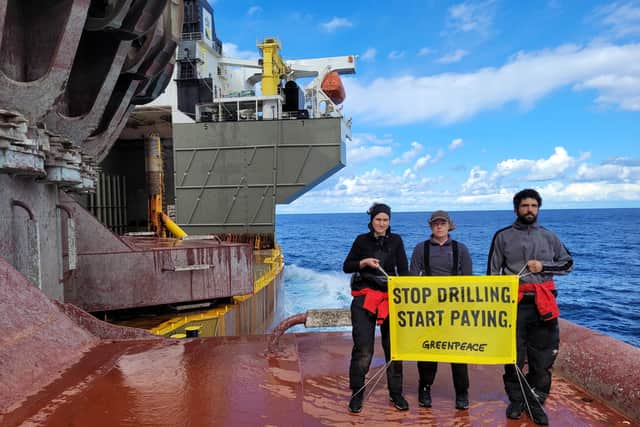Greenpeace: Oil giant Shell sues climate group for £1.7m - unless it stops protests at ports and oil platforms
and live on Freeview channel 276
Oil giant Shell is suing Greenpeace for £1.7 million, unless the environmental campaign group agrees to stop protesting at its oil rigs and ports ever again.
It comes after a protest by Greenpeace International earlier this year, which saw activists occupy a moving oil platform to protest against the climate change loss and damage caused by the continued burning of fossil fuels. They boarded a ship hauling the new floating production and storage unit as it was en route to the Penguins oilfield in the Shetland Islands, remaining onboard for 13 days, from 31 January to 12 February.
Advertisement
Hide AdAdvertisement
Hide AdShell is suing Greenpeace for £1.7 million, to help recuperate the "significant costs of responding to Greenpeace’s dangerous actions". But the climate campaign group says the lawsuit has also been filed by a number of contractors also seeking damages, which could see it sued for as much as £7 million. Greenpeace says they have offered to settle for a reduced amount, so long as all Greenpeace organisations agree to never protest on its infrastructure again, "at sea or in port anywhere in the world".
Greenpeace is calling the claim one of the biggest legal threats against its ability to campaign in its more than 50-year history. Campaigners believe the "aggressive legal tactics" are a bid to silence growing dissent over Shell chief executive Wael Sawan’s moves to "double down on fossil fuel investment and abandon any pretence of transition to renewables".


Yeb Saño, executive director of Greenpeace Southeast Asia, who was part of the oil platform protest, is among the activists individually named in Shell’s legal claim. In a statement, Mr Saño said: “I have lived through the devastation caused by Shell and companies like them. Ten years ago I spoke at COP global climate talks while my brother was still missing in the fall-out from Super Typhoon Haiyan."
“Incredibly, he survived, but he helped carry the bodies of 78 innocent people who tragically did not," he continued. He vowed to stand up in court and fight the lawsuit. "Shell is trying to silence my legitimate demands - that it must stop its senseless and greedy pursuit of fossil fuels and take accountability for the destruction it is wreaking upon the world."
Advertisement
Hide AdAdvertisement
Hide AdGreenpeace UK co-executive director Areeba Hamid said that under Wael Sawan, Shell had "abandoned any pretence of good intentions" regarding green policies and renewable energy. She said the company was "brazenly embracing a sinister strategy that’s not just risky for shareholders, but completely devastating for people on the front-lines of the climate crisis".
"Now he’s trying to crush Greenpeace’s ability to campaign, and in doing so, seeking to silence legitimate demands for climate justice and payment for loss and damage," she continued. "We need this case to be thrown out and for Shell to be regulated by the government because it’s clear Sawan is hell-bent on profit, regardless of human cost.”
A Shell spokesperson told NationalWorld that the right to protest was "fundamental and we respect it absolutely". However, they said it must be done safely and lawfully.
"Boarding a 72,000 metric ton moving vessel at sea was unlawful and extremely dangerous. A judge said Greenpeace protestors were 'putting their lives and, indirectly, the lives of the crew at risk,'" they continued. "The legal costs to secure two court injunctions to prevent further boarding were significant. So were the costs for the companies who had to deal with the action at sea, for example by mobilising an extra safety vessel and increasing security at the port."
Advertisement
Hide AdAdvertisement
Hide AdThe safety of the protestors – and the crew – had been paramount, Shell said, and they did not hesitate to put in place measures to protect all people involved. "Shell and its contractors are entitled to recover the significant costs of responding to Greenpeace’s dangerous actions.”
At the time of the protest on the new floating oil platform, a Shell spokesperson said households, motorists and businesses still needed a stable supply of oil and gas, which remained a key part of the UK energy mix as it established more renewable power sources. "Projects like Penguins are vital to that supply and help reduce the UK’s reliance on higher carbon and costlier energy imports.
"Locally-produced, responsible oil and gas production is critical for UK energy security and entirely consistent with a net zero pathway as modelled by the UK’s independent Climate Change Committee," Shell said. But after decades of supplying oil and gas, output from the UK North Sea was tailing off, and met less than 50% of the UK’s demand.
"It is important to stop it tailing off too steeply, while the transition to low-carbon energy gathers pace. The new floating vessel will allow production from the Penguins field to continue to provide the necessary energy that the UK needs."
Comment Guidelines
National World encourages reader discussion on our stories. User feedback, insights and back-and-forth exchanges add a rich layer of context to reporting. Please review our Community Guidelines before commenting.
